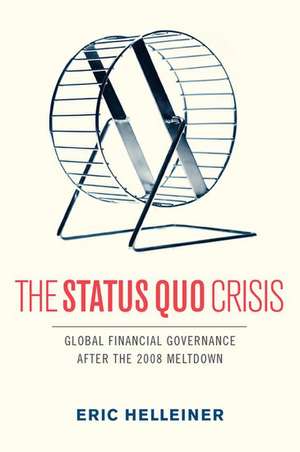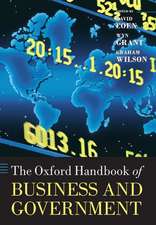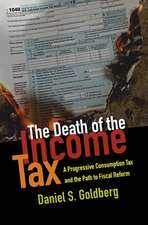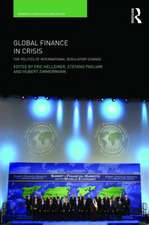The Status Quo Crisis: Global Financial Governance After the 2008 Meltdown
Autor Eric Helleineren Limba Engleză Hardback – 7 aug 2014
Preț: 281.77 lei
Preț vechi: 349.34 lei
-19% Nou
Puncte Express: 423
Preț estimativ în valută:
53.92€ • 56.09$ • 44.52£
53.92€ • 56.09$ • 44.52£
Carte tipărită la comandă
Livrare economică 01-07 aprilie
Preluare comenzi: 021 569.72.76
Specificații
ISBN-13: 9780199973637
ISBN-10: 0199973636
Pagini: 248
Dimensiuni: 272 x 160 x 18 mm
Greutate: 0.48 kg
Editura: Oxford University Press
Colecția OUP USA
Locul publicării:New York, United States
ISBN-10: 0199973636
Pagini: 248
Dimensiuni: 272 x 160 x 18 mm
Greutate: 0.48 kg
Editura: Oxford University Press
Colecția OUP USA
Locul publicării:New York, United States
Recenzii
Eric Helleiner convincingly demonstrates that formal international institutions were largely irrelevant in the 2008 global financial crisis. Instead, central banks, and especially the US FED, shaped responses in favor of a status quo outcome for banking interests.
The Status Quo Crisis is the first book to show how the global policy response to the first truly global financial crash since the 1930s leaves the world vulnerable to more. It should be required reading for those keen to ensure that people and capitalism are not subject to a repeat performance for a long time to come. The last chapter describes four 'what next?' scenarios, one of which has the virtue of being optimistic.
Another outstanding book from one of the stars of the field of International Political Economy -an analysis that is at once informed, articulate, and remarkably insightful. Eric Helleiner's ability to distill and explain major historical events is uncanny.
For his expertise in international monetary and financial policy, and his ability to write about such subjects cogently and insightfully, Eric Helleiner is unsurpassed. This immensely important book provides a sobering analysis of how little has been done since the global financial crisis to change the workings and regulation of the world economy and financial markets.
Few people other than Eric Helleiner have the authority to take stock on the state of global economic governance after the financial crisis of 2008. In a book that is masterfully rigorous but broadly accessible, Helleiner shows that the same system of global economic governance that failed to prevent the crisis of 2008 also failed to manage the so-called recovery. Worse still, while there have been pockets of reform that deserve merit, Helleiner demonstrates that little has been done to reform the system so as to prevent the next crisis. Not only does Helleiner confirm this lack of significant change-or the maintenance of the 'status quo'-he gives insight as to how/why significant change failed to come about. This book should be required reading for scholars of politics and economics and for policy-makers across the globe. There is still much work to be done.
The Status Quo Crisis is the first book to show how the global policy response to the first truly global financial crash since the 1930s leaves the world vulnerable to more. It should be required reading for those keen to ensure that people and capitalism are not subject to a repeat performance for a long time to come. The last chapter describes four 'what next?' scenarios, one of which has the virtue of being optimistic.
Another outstanding book from one of the stars of the field of International Political Economy -an analysis that is at once informed, articulate, and remarkably insightful. Eric Helleiner's ability to distill and explain major historical events is uncanny.
For his expertise in international monetary and financial policy, and his ability to write about such subjects cogently and insightfully, Eric Helleiner is unsurpassed. This immensely important book provides a sobering analysis of how little has been done since the global financial crisis to change the workings and regulation of the world economy and financial markets.
Few people other than Eric Helleiner have the authority to take stock on the state of global economic governance after the financial crisis of 2008. In a book that is masterfully rigorous but broadly accessible, Helleiner shows that the same system of global economic governance that failed to prevent the crisis of 2008 also failed to manage the so-called recovery. Worse still, while there have been pockets of reform that deserve merit, Helleiner demonstrates that little has been done to reform the system so as to prevent the next crisis. Not only does Helleiner confirm this lack of significant change-or the maintenance of the 'status quo'-he gives insight as to how/why significant change failed to come about. This book should be required reading for scholars of politics and economics and for policy-makers across the globe. There is still much work to be done.
Notă biografică
Eric Helleiner is Professor of Political Science and CIGI Chair in International Political Economy, University of Waterloo, and author of States and the Reemergence of Global Finance (Cornell UP) and The Making of National Money (Cornell UP)

















